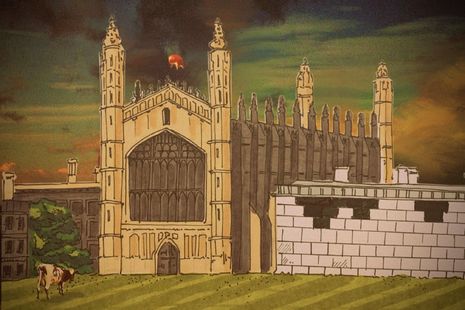Cambridge’s musical monuments
The streets of Cambridge are storied moments from musical history, says Daniel Kamaluddin

Meandering through Coe Fen past cows and the winding water, blasting music into your Airpods after a supervision that took a little too much out of you, you might not think that the very path on which you walk is where one of the most well-known tunes in the history of British classical music was conceived.
Yet, it was here that Ken Naylor, who taught at the Leys School, wrote the tune of ‘Coe Fen’, which became the rousing hymn ‘How Shall I Sing That Majesty’. The hymn has a sense of rising which perfectly matches a bright spring day in Coe Fen and the upper and lower voices mirror each other as they alternate in the middle verses, reflective like the water that flows through the fen.
“With the most organs per head in the United Kingdom, countless pubs, chapels and concert halls, the streets of Cambridge jostle with musical history”
With the most organs per head in the United Kingdom, countless pubs, chapels and concert halls, the streets of Cambridge hum with musical history. A short stroll up the Cam from Coe Fen past picnickers, you come to The Anchor pub, from whose terrace you can watch punters glide by. It was here that Syd Barret of Pink Floyd had his first gigs at what was then called the Riverside Jazz Club.
Walking down Silver Street and following the road to the left, you pass David Gilmour’s home just outside Grantchester and come eventually to Grantchester Meadows to which Pink Floyd dedicated a stunning, gentle track on Ummagumma which is laced with the soothing chirping of birds.
Strolling back in to the town centre from Grantchester, you come to King’s Parade where you can stare up at the gothic spires of King’s Chapel under whose shadow Pink Floyd performed in 1968 at the May Ball. This concert inspired the track ‘Brain Damage’, with Waters saying he was thinking of the Back Lawn at King's when he wrote about the "lunatic on the grass". Clearly the gig went down well since they returned to play in what is now King’s Bunker four years later.
Rushing back to catch the train to King’s Cross, you might pass Rock Road, where Roger Waters grew up, only a short stroll from Cambridge Junction, which has been a nesting ground for many generation-defining artists when they were early in their careers, like Radiohead and Amy Winehouse.
“The next time your friends ask you out to see a band at Clare Cellars you have never heard of, go for it, they might just be the next Pink Floyd!”
As much as I love Pink Floyd’s epic, soaring, experimental tracks, they are by no means the only great band to have formed in Cambridge. Katrina and the Waves, renowned for their sunsoaked, upbeat hit Walking On Sunshine, formed in Cambridge in 1981 and performed most of their early gigs around Cambridge, especially at the US army club at RAF Lakenheath, just outside the city.
Unlike Pink Floyd and Katrina and the Waves, who grew up in Cambridge, Clean Bandit are perhaps the most famous Cambridge student band, having met while undergrads at Jesus. Reflecting the prominence of classical music on the Cambridge music scene, the band brilliantly blend traditionally orchestral instruments with bouncy pop beats in their hits like Rather Be and Symphony.
More recently, Black Country, New Road, who formed in Cambridge in 2018, have taken the indie scene by storm with their delightfully innovative mix of instruments and their incredible vocals. Cambridge’s classical and popular music traditions do not conflict but overlay and overlap, a recent student concert at Peterhouse blended early modern music with jazz, for example.
Wherever you look in Cambridge, there is music making to be enjoyed, continuing in buildings where music has thrived for generations. Cambridge is a musical Eden. So the next time your friends ask you out to see a band at Clare Cellars you have never heard of, go for it – they might just be the next Pink Floyd.
 News / Deborah Prentice overtaken as highest-paid Russell Group VC2 February 2026
News / Deborah Prentice overtaken as highest-paid Russell Group VC2 February 2026 News / Christ’s announces toned-down ‘soirée’ in place of May Ball3 February 2026
News / Christ’s announces toned-down ‘soirée’ in place of May Ball3 February 2026 Fashion / A guide to Cambridge’s second-hand scene2 February 2026
Fashion / A guide to Cambridge’s second-hand scene2 February 2026 News / Downing Bar dodges college takeover31 January 2026
News / Downing Bar dodges college takeover31 January 2026 Comment / Men at Cambridge are experiencing equality2 February 2026
Comment / Men at Cambridge are experiencing equality2 February 2026










